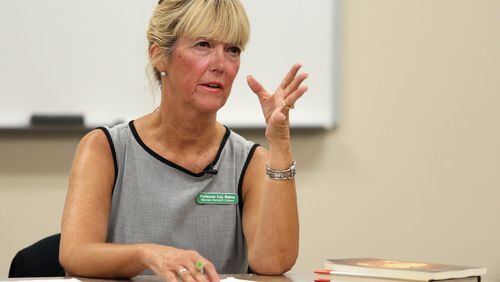Our lagging math numbers
The National Assessment of Educational Progress, known as “the nation’s report card,” shows Georgia’s fourth-grade students’ average score ranked 36th in 2013 among the states; for eighth grade, Georgia ranked 41st.
Georgia high schoolers’ SAT results showed a decrease in the mean average math score, with the state’s students scoring 487 in 2013 compared to 491 in 2003; the national scores for the same years are 514 and 519, respectively. Georgia came in 45th nationally for its combined reading, writing and math SAT scores, according to a ranking compiled by the Commonwealth Foundation, a conservative-leaning think tank.
Math performance in the U.S. has long lagged other countries. In 2012, the U.S. scored below average in math among the 34 nations participating in the Program for International Student Assessment, and is ranked 27th.
Sources:
Dr. Barbara J. Reys, co-director of the Center for the Study of Mathematics Curriculum at Missouri University
Dr. Denise Spangler, associate dean for faculty and Bebe Aderhold Professor in Early Childhood Education at UGA.
MET I: http://cbmsweb.org/MET_Document/
MET II: http://www.cbmsweb.org/MET2/met2.pdf
-- Emily Farlow
Potential solutions to Georgia’s math problem
Unlike Georgia, North Carolina pays for its high school juniors to take the ACT college entrance exam so educators can gauge how well they fare compared to those in other states, as part of an effort to improve math performance.
To improve Georgia’s education preparation programs, education advocates say the G.P.A. requirement should be raised for admission into teaching programs; there can also be increased math testing for elementary-level teaching candidates.
A growing number of school districts across the U.S. are turning to “platooning” – teachers with specialized knowledge in science and math teach those subjects in elementary school classes, so students get the most qualified educators in those fields.
For 10-year-old Catrell Shabazz, math homework often led to groans of frustration. He toiled long hours trying to learn multiplication tables, but it was a struggle.
“It was hard for me because … I didn’t get it at all,” said Shabazz, who attends middle school in north Fulton County. “To me, math was just a bunch of numbers, and it was very confusing.”
Shabazz is among the many Georgia students who have struggled with math – a decades-long problem that’s still crippling their chances to prosper in college and compete for top careers.
The stakes could not be higher, with Georgia poised to lose out on thousands of high-paying jobs that require math knowledge or expertise.
To solve the problem, state education leaders are banking largely on a more conceptual approach in math curriculum, but there are significant obstacles to overcome, an examination by The Atlanta Journal-Constitution revealed.
Classroom teachers don’t often fully understand the math themselves. Poorly ranked colleges of education are not fully equipping them, and Georgia is spending less to train educators while expecting them to master a new approach.
» TIMELINE: See how math education has changed over the years
Contributing to the problem is the widely held perception in the U.S. that math ability is innate, not something gained by practice and hard work. And as Georgia students return to school this month, experts say many parents are not doing enough to cultivate children’s interest in math.
There’s been a strong movement at home and at school to make sure kids are proficient readers, said Dale Farran, a professor of education and psychology at Vanderbilt University’s Peabody College. But with math, that’s not been the case.
“What the public was told and what teachers have believed is that if you teach children to read, they can do everything else, and that’s simply not true in terms of math,” Farran said.
“In fact, we should probably flip the amount of time we’re spending on literacy versus math,” he said. “Parents are buying all these toys that teach the ABCs and are very concerned about reading because we’ve flooded them with information about how important reading was. And we haven’t done anything similar in terms of how important math is.”
The nation lags much of the world in math, and Georgia students perform particularly poorly, ranking in the bottom half on national tests. And on state standardized tests, several recently released results show students continuing to struggle in math.
Georgia has not kept pace with states that have introduced more rigorous teacher-certification requirements and taken fresh approaches to math instruction, according to education experts and advocates. The state has also decreased funds for training educators — in all subjects, not just math — allocating nearly $31.4 million for the 2014-15 school year from $33.9 million the previous year. State officials say declines in state spending for teacher training are offset by some $10.6 million of Georgia’s nearly $400 million federal Race to the Top funds.
“We’re taking teachers and just sticking them in the classroom and saying, ‘Here you go. You need to teach this course,’ ” said Kay Mahne, a professor at Georgia Gwinnett College, who oversees the education of future K-12 math teachers. “They’re overwhelmed. They’re confused … and if the teacher’s confused, the kids are going to be confused.”
Georgia’s math problem is affecting the state’s economic development prospects, said Dana Rickman, director for policy and research with Georgia Partnership for Excellence in Education, an advocacy group with ties to Georgia business.
“The projections we’ve seen are that jobs in the STEM (science, technology, engineering and mathematics) field, they’re expected to grow by about 22 percent,” with some 200,000 jobs in health care and other STEM fields expected by 2018 in Georgia. “If we don’t have a workforce that can support that, those jobs are going to go somewhere else.”
A conceptual approach
State educators say the new Common Core standards - controversial among some, who criticize them as a federal intrusion in schools - should help buoy math performance. Over the past decade, Georgia has followed a pattern similar to other states: moving from a math curriculum that touched a number of topics toward a more conceptual approach under first Georgia Performance Standards, now Common Core. Some critics complain the changing curriculum has contributed to Georgia’s problems.
Under Common Core math, teachers focus on fewer topics and explore them more deeply instead of teaching numerous math topics and repeating them from grade to grade because students don’t fully grasp them.
“We teach fractions starting in third grade, and we teach them every single year through eighth grade,” said Morgan Polikoff, assistant professor of education at the University of Southern California, who’s written extensively about U.S. math education. “And yet at the end of eighth grade, students still don’t know fractions.”
“I think in other countries … they introduce them using multiple representations, and because they help students understand what a fraction is early on, then they don’t have to cover it for five or six grades.”
Common Core attempts to mimic results in higher-achieving countries such as Singapore and South Korea, where math is thought of as something that must be learned through practice and hard work.
In math classrooms in Asia, a teacher primarily leads the teaching of math, unlike in the U.S., where students often are divided into groups or practice at their desks – unaided by teachers. School days are typically longer in Asian countries, and a greater proportion of the time is spent on math.
Thurston Domina, a sociologist of education professor at University of California Irvine, says race, class and other socioeconomic factors can influence how students perform.
So, too, can the cultural attitude in the U.S. “So kids will tell you, ‘I’m good at math’ or ‘I’m not good at math.’ And that’s not good for anybody,” Domina said. “The culture around math is particularly unhealthy in this country.”
“I can make myself a better writer,” he added. “Everybody can sort of see that, work that pays off. But math, we don’t think about it that way. We talk about math as being about ability. When you talk to math educators, they’re really worrying about that … ‘How can I as a teacher ward off this mindset?’ ”
Tameka Pero has had to ward off that mindset with her daughter Sydney, who doesn’t see herself as a “math person” but as more inclined to subjects like social studies. Sydney, 12, who attends school in Fulton County, has struggled with math and sought tutoring, working long hours to get her grade up to a B.
“I don’t know why it’s intimidating for her,” Pero said. “I never really liked math. I don’t know if that’s something that could be hereditary. But I’ve never tried to portray that to her, so she doesn’t know that I never really liked math.”
Christopher Danielson, a math teacher in Minnesota who started the blog Talking Math With Your Kids, said, "Parents feel scared by it if they don't self-identify as math people, and that's a huge part of our culture – that you either do or you don't. Then they're sort of terrified of it, and it's very easy to pass along those feelings to your kids."
Danielson says it’s important for parents to talk about numbers and shapes every day with kids, showing how math can be fun and relevant in life. That can include, for example, counting the stoplights and cars in traffic.
“Every time I’m in a large group and somebody introduces me as a math teacher, somebody is going to say to me, ‘I couldn’t do that, I was never any good at math.’ That’s a pervasive cultural message,” he said.
Polikoff and other math scholars see Common Core math as a step in the right direction. But teachers and parents are having a hard time explaining Common Core math to kids because it’s not the rote learning they grew up with.
Mahne, the college math education teacher, says most of her students are also having to relearn math in a different way to relate it to students.
During a recent lesson, one of Mahne’s teaching students, James Kelley, held up a Connect Four game before a classroom filled with future elementary school teachers. He was using the game’s rows of red and black checkers to show how young students can learn multiplication.
Kelley, like the dozen or so students in Mahne’s class, is practicing different teaching methods to prepare him to teach children after he graduates. Using concrete examples like the Connect Four game can more effectively show children the meaning of numbers, giving them a conceptual understanding of math.
“Teaching math with visuals helps students understand why seven times six equals 42, for example, instead of having them memorize multiplication tables, which is the way I learned, the way a lot of children in Georgia graduating now have been taught,” Kelley said.
“I really don’t understand it myself”
Kim White, Catrell Shabazz's mother, said by fourth grade he began to falter in math, particularly with multiplication tables. Frustrated by the lack of support from her son's school, she sought help from the tutoring group Math is My Friend.
White asked her son’s fifth-grade teacher for help in understanding the math herself, so she could help him with his homework. The answer shocked her.
“She was like, ‘I’ve got to be honest with you. I really don’t understand it myself.’ As a mother, I don’t want to hear that … I looked at her and thought, ‘Is she serious?’ ”
Georgia and other states have grappled for years with finding highly qualified educators to teach math. Average teacher salary in Georgia is close to $53,000, among the higher pay grades in the Southeast, but often not enough to lure talented math and science professionals from higher-paying private-sector jobs.
State lawmakers attempted to address the issue in 2009, approving for some math and science teachers a pay bump of up to a $1,000 per year for up to 5 years.
Teacher training has been a concern historically, especially at the elementary grades, which attract fewer math natives, USC’s Polikoff said.
The state is “working to try to ensure teachers that are coming out of (education) programs now are prepared to teach at that new level of depth,” said Matt Cardoza, spokesman for the Georgia Department of Education. The state has also recently embarked on a Career Pathways curriculum in high schools, aimed at showing students how math and other subjects are relevant in their daily lives and potential careers, Cardoza said.
Georgia's teacher-preparation programs earned less than stellar marks on a recently released 2014 report by the National Council on Teacher Quality, which evaluated 1,612 programs across the U.S. In Georgia, only Clayton State University earned national 'Top Ranked' status — a distinction awarded to 107 programs.
“It does seem to be the case that most of the schools of education in Georgia we looked at are not consistent across the board,” said Arthur McKee, managing director of teacher-preparation studies at the National Council of Teacher Quality.
McKee advised Georgia to raise the G.P.A. requirement for admission into teacher programs. He also said Georgia should beef up math testing for its elementary school teaching candidates.
In Georgia, teaching candidates who want to work in elementary schools take one math test as part of their certification. Middle and high school candidates take at least two. Other states such as North Carolina have started requiring elementary teachers to pass an extra math “subtest” to be licensed.
Kym Estis, whose two sons have struggled with math at North Atlanta High school, says both had to get tutoring. She attributes their problems to poor teachers, including one who lost homework and was chronically disorganized.
“It felt like, ‘I’ve got a job, and I don’t really care how I do it or what the impact is,’ ” Estis said. “My sense is that it’s really difficult for (Atlanta Public Schools) to get qualified science and math teachers … I think they don’t pay enough to lure people from the private sector. Finding someone to teach in a public school classroom is challenging.”
Search for solutions
In North Carolina, where scores on math standardized tests are higher than in Georgia, state educators have aggressively tried to keep math scores and performance going up over the past decade.
Unlike Georgia, North Carolina pays for its high school juniors to take the ACT college entrance exam so educators can gauge how well they fare compared to those in other states, as part of an effort to improve math performance. It’s also tapped math and education experts in its universities to help train teachers.
“There are a lot of high-tech jobs in North Carolina, and we’d like for our own children to be able to get them,” said Rebecca Garland, deputy state superintendent for North Carolina’s department of public instruction. “When we’ve got the Research Triangle and all of these other STEM companies that have come to North Carolina, the pharmaceuticals that have come here, we want North Carolina children to get those jobs. They have to have math skills to get them.”
Other states are also trying innovative approaches.
Math education experts say an increasing number of school districts are turning to “platooning” – where teachers with specialized knowledge in science and math teach those subjects in elementary school classes, so students get the most qualified educators in those fields. In contrast, Georgia elementary school teachers typically cover all or most subjects in their classrooms, including math.
Dan Funsch, president of the Georgia Council of Teachers of Mathematics, a group of about 3,000 K-12 math teachers, says poor math achievement in some students can also be tied to their families’ hectic lives. Often, with both parents working, or single parents, students don’t get support with math homework.
On teacher training in math, “I think there is a tremendous deficit there, on the broadest level,” Funsch said. “The fact is I think a lot of teachers are ill-equipped because the … world of education has kind of continued to move on and (they) maybe haven’t kept up.”
“Change does not happen quickly,” he said. “Teachers often know what to do but kind of being able to retool their habits, their expectations, their classrooms, relationships with other teachers in their building, to be able to retool that to get to a different place is a lifetime challenge.”
About the Author







